
agents
A collection of production-ready subagents for Claude Code
Stars: 13451
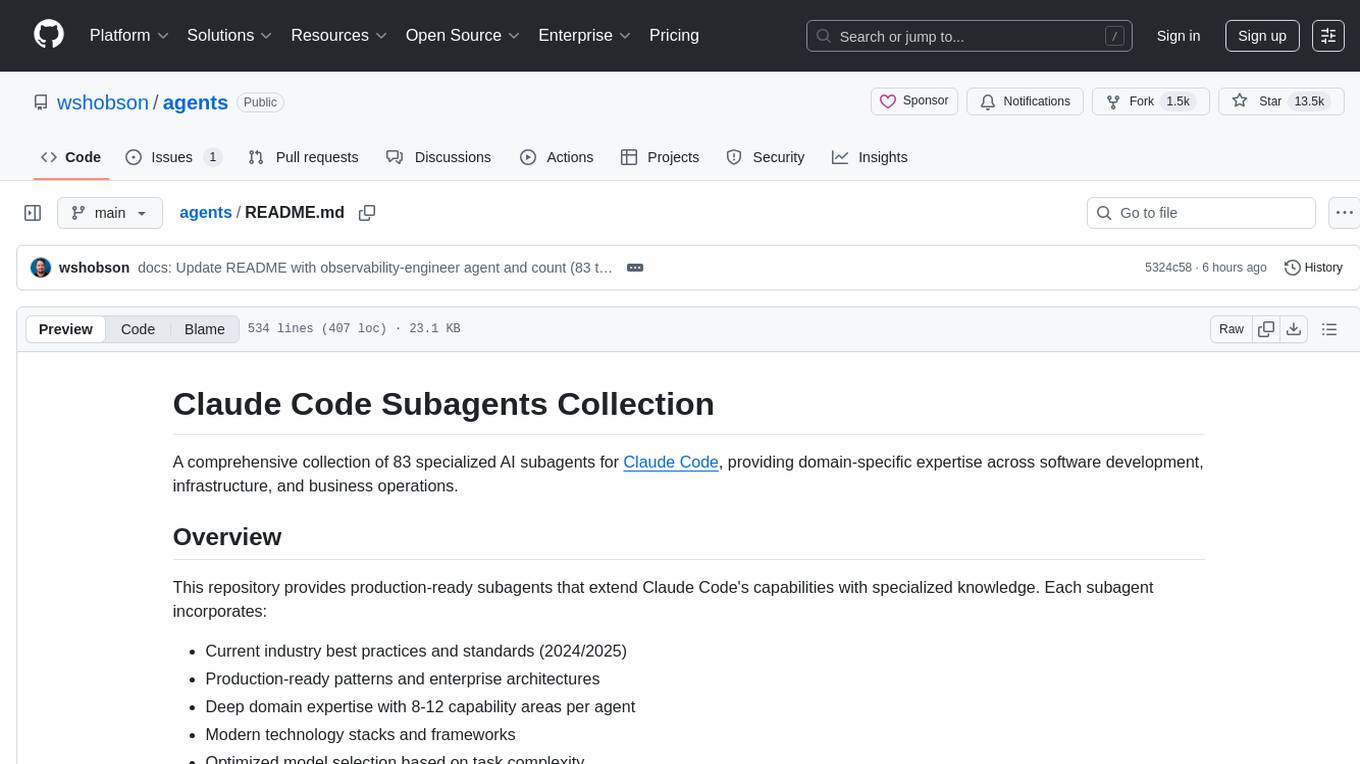
The 'agents' repository is a comprehensive collection of 83 specialized AI subagents for Claude Code, providing domain-specific expertise across software development, infrastructure, and business operations. Each subagent incorporates current industry best practices, production-ready patterns, deep domain expertise, modern technology stacks, and optimized model selection based on task complexity.
README:
A comprehensive collection of 83 specialized AI subagents for Claude Code, providing domain-specific expertise across software development, infrastructure, and business operations.
This repository provides production-ready subagents that extend Claude Code's capabilities with specialized knowledge. Each subagent incorporates:
- Current industry best practices and standards (2024/2025)
- Production-ready patterns and enterprise architectures
- Deep domain expertise with 8-12 capability areas per agent
- Modern technology stacks and frameworks
- Optimized model selection based on task complexity
| Agent | Model | Description |
|---|---|---|
| backend-architect | opus | RESTful API design, microservice boundaries, database schemas |
| frontend-developer | sonnet | React components, responsive layouts, client-side state management |
| graphql-architect | opus | GraphQL schemas, resolvers, federation architecture |
| architect-reviewer | opus | Architectural consistency analysis and pattern validation |
| cloud-architect | opus | AWS/Azure/GCP infrastructure design and cost optimization |
| hybrid-cloud-architect | opus | Multi-cloud strategies across cloud and on-premises environments |
| kubernetes-architect | opus | Cloud-native infrastructure with Kubernetes and GitOps |
| Agent | Model | Description |
|---|---|---|
| ui-ux-designer | sonnet | Interface design, wireframes, design systems |
| ui-visual-validator | sonnet | Visual regression testing and UI verification |
| mobile-developer | sonnet | React Native and Flutter application development |
| ios-developer | sonnet | Native iOS development with Swift/SwiftUI |
| flutter-expert | sonnet | Advanced Flutter development with state management |
| Agent | Model | Description |
|---|---|---|
| c-pro | sonnet | System programming with memory management and OS interfaces |
| cpp-pro | sonnet | Modern C++ with RAII, smart pointers, STL algorithms |
| rust-pro | sonnet | Memory-safe systems programming with ownership patterns |
| golang-pro | sonnet | Concurrent programming with goroutines and channels |
| Agent | Model | Description |
|---|---|---|
| javascript-pro | sonnet | Modern JavaScript with ES6+, async patterns, Node.js |
| typescript-pro | sonnet | Advanced TypeScript with type systems and generics |
| python-pro | sonnet | Python development with advanced features and optimization |
| ruby-pro | sonnet | Ruby with metaprogramming, Rails patterns, gem development |
| php-pro | sonnet | Modern PHP with frameworks and performance optimization |
| Agent | Model | Description |
|---|---|---|
| java-pro | sonnet | Modern Java with streams, concurrency, JVM optimization |
| scala-pro | sonnet | Enterprise Scala with functional programming and distributed systems |
| csharp-pro | sonnet | C# development with .NET frameworks and patterns |
| Agent | Model | Description |
|---|---|---|
| elixir-pro | sonnet | Elixir with OTP patterns and Phoenix frameworks |
| unity-developer | sonnet | Unity game development and optimization |
| minecraft-bukkit-pro | sonnet | Minecraft server plugin development |
| sql-pro | sonnet | Complex SQL queries and database optimization |
| Agent | Model | Description |
|---|---|---|
| devops-troubleshooter | sonnet | Production debugging, log analysis, deployment troubleshooting |
| deployment-engineer | sonnet | CI/CD pipelines, containerization, cloud deployments |
| terraform-specialist | opus | Infrastructure as Code with Terraform modules and state management |
| dx-optimizer | sonnet | Developer experience optimization and tooling improvements |
| Agent | Model | Description |
|---|---|---|
| database-optimizer | opus | Query optimization, index design, migration strategies |
| database-admin | sonnet | Database operations, backup, replication, monitoring |
| Agent | Model | Description |
|---|---|---|
| incident-responder | opus | Production incident management and resolution |
| network-engineer | sonnet | Network debugging, load balancing, traffic analysis |
| Agent | Model | Description |
|---|---|---|
| code-reviewer | opus | Code review with security focus and production reliability |
| security-auditor | opus | Vulnerability assessment and OWASP compliance |
| backend-security-coder | opus | Secure backend coding practices, API security implementation |
| frontend-security-coder | opus | XSS prevention, CSP implementation, client-side security |
| mobile-security-coder | opus | Mobile security patterns, WebView security, biometric auth |
| architect-reviewer | opus | Architectural consistency and pattern validation |
| Agent | Model | Description |
|---|---|---|
| test-automator | sonnet | Comprehensive test suite creation (unit, integration, e2e) |
| tdd-orchestrator | sonnet | Test-Driven Development methodology guidance |
| debugger | sonnet | Error resolution and test failure analysis |
| error-detective | sonnet | Log analysis and error pattern recognition |
| Agent | Model | Description |
|---|---|---|
| performance-engineer | opus | Application profiling and optimization |
| observability-engineer | opus | Production monitoring, distributed tracing, SLI/SLO management |
| search-specialist | haiku | Advanced web research and information synthesis |
| Agent | Model | Description |
|---|---|---|
| data-scientist | opus | Data analysis, SQL queries, BigQuery operations |
| data-engineer | sonnet | ETL pipelines, data warehouses, streaming architectures |
| Agent | Model | Description |
|---|---|---|
| ai-engineer | opus | LLM applications, RAG systems, prompt pipelines |
| ml-engineer | opus | ML pipelines, model serving, feature engineering |
| mlops-engineer | opus | ML infrastructure, experiment tracking, model registries |
| prompt-engineer | opus | LLM prompt optimization and engineering |
| Agent | Model | Description |
|---|---|---|
| docs-architect | opus | Comprehensive technical documentation generation |
| api-documenter | sonnet | OpenAPI/Swagger specifications and developer docs |
| reference-builder | haiku | Technical references and API documentation |
| tutorial-engineer | sonnet | Step-by-step tutorials and educational content |
| mermaid-expert | sonnet | Diagram creation (flowcharts, sequences, ERDs) |
| Agent | Model | Description |
|---|---|---|
| business-analyst | sonnet | Metrics analysis, reporting, KPI tracking |
| quant-analyst | opus | Financial modeling, trading strategies, market analysis |
| risk-manager | sonnet | Portfolio risk monitoring and management |
| Agent | Model | Description |
|---|---|---|
| content-marketer | sonnet | Blog posts, social media, email campaigns |
| sales-automator | haiku | Cold emails, follow-ups, proposal generation |
| Agent | Model | Description |
|---|---|---|
| customer-support | sonnet | Support tickets, FAQ responses, customer communication |
| hr-pro | opus | HR operations, policies, employee relations |
| legal-advisor | opus | Privacy policies, terms of service, legal documentation |
| Agent | Model | Description |
|---|---|---|
| blockchain-developer | sonnet | Web3 apps, smart contracts, DeFi protocols |
| payment-integration | sonnet | Payment processor integration (Stripe, PayPal) |
| legacy-modernizer | sonnet | Legacy code refactoring and modernization |
| context-manager | haiku | Multi-agent context management |
| Agent | Model | Description |
|---|---|---|
| seo-content-auditor | sonnet | Content quality analysis, E-E-A-T signals assessment |
| seo-meta-optimizer | haiku | Meta title and description optimization |
| seo-keyword-strategist | haiku | Keyword analysis and semantic variations |
| seo-structure-architect | haiku | Content structure and schema markup |
| seo-snippet-hunter | haiku | Featured snippet formatting |
| seo-content-refresher | haiku | Content freshness analysis |
| seo-cannibalization-detector | haiku | Keyword overlap detection |
| seo-authority-builder | sonnet | E-E-A-T signal analysis |
| seo-content-writer | sonnet | SEO-optimized content creation |
| seo-content-planner | haiku | Content planning and topic clusters |
Agents are assigned to specific Claude models based on task complexity and computational requirements. The system uses three model tiers:
| Model | Agent Count | Use Case |
|---|---|---|
| Haiku | 11 | Quick, focused tasks with minimal computational overhead |
| Sonnet | 46 | Standard development and specialized engineering tasks |
| Opus | 22 | Complex reasoning, architecture, and critical analysis |
| Category | Agents |
|---|---|
| Context & Reference |
context-manager, reference-builder, sales-automator, search-specialist
|
| SEO Optimization |
seo-meta-optimizer, seo-keyword-strategist, seo-structure-architect, seo-snippet-hunter, seo-content-refresher, seo-cannibalization-detector, seo-content-planner
|
| Category | Count | Agents |
|---|---|---|
| Programming Languages | 18 | All language-specific agents (JavaScript, Python, Java, C++, etc.) |
| Frontend & UI | 5 |
frontend-developer, ui-ux-designer, ui-visual-validator, mobile-developer, ios-developer
|
| Infrastructure | 8 |
devops-troubleshooter, deployment-engineer, dx-optimizer, database-admin, network-engineer, flutter-expert, api-documenter, tutorial-engineer
|
| Quality & Testing | 4 |
test-automator, tdd-orchestrator, debugger, error-detective
|
| Business & Support | 6 |
business-analyst, risk-manager, content-marketer, customer-support, mermaid-expert, legacy-modernizer
|
| Data & Content | 5 |
data-engineer, payment-integration, seo-content-auditor, seo-authority-builder, seo-content-writer
|
| Category | Count | Agents |
|---|---|---|
| Architecture & Design | 7 |
architect-reviewer, backend-architect, cloud-architect, hybrid-cloud-architect, kubernetes-architect, graphql-architect, terraform-specialist
|
| Critical Analysis | 6 |
code-reviewer, security-auditor, performance-engineer, observability-engineer, incident-responder, database-optimizer
|
| AI/ML Complex | 5 |
ai-engineer, ml-engineer, mlops-engineer, data-scientist, prompt-engineer
|
| Business Critical | 4 |
docs-architect, hr-pro, legal-advisor, quant-analyst
|
Clone the repository to the Claude agents directory:
cd ~/.claude
git clone https://github.com/wshobson/agents.gitThe subagents will be automatically available to Claude Code once placed in the ~/.claude/agents/ directory.
Claude Code automatically selects the appropriate subagent based on task context and requirements. The system analyzes your request and delegates to the most suitable specialist.
Specify a subagent by name to use a particular specialist:
"Use code-reviewer to analyze the recent changes"
"Have security-auditor scan for vulnerabilities"
"Get performance-engineer to optimize this bottleneck"
code-reviewer: Analyze component for best practices
security-auditor: Check for OWASP compliance
tdd-orchestrator: Implement feature with test-first approach
performance-engineer: Profile and optimize bottlenecks
backend-architect: Design authentication API
frontend-developer: Create responsive dashboard
graphql-architect: Design federated GraphQL schema
mobile-developer: Build cross-platform mobile app
devops-troubleshooter: Analyze production logs
cloud-architect: Design scalable AWS architecture
network-engineer: Debug SSL certificate issues
database-admin: Configure backup and replication
terraform-specialist: Write infrastructure modules
data-scientist: Analyze customer behavior dataset
ai-engineer: Build RAG system for document search
mlops-engineer: Set up experiment tracking
ml-engineer: Deploy model to production
business-analyst: Create metrics dashboard
docs-architect: Generate technical documentation
api-documenter: Write OpenAPI specifications
content-marketer: Create SEO-optimized content
Subagents coordinate automatically for complex tasks. The system intelligently sequences multiple specialists based on task requirements.
Feature Development
"Implement user authentication"
→ backend-architect → frontend-developer → test-automator → security-auditor
Performance Optimization
"Optimize checkout process"
→ performance-engineer → database-optimizer → frontend-developer
Production Incidents
"Debug high memory usage"
→ incident-responder → devops-troubleshooter → error-detective → performance-engineer
Infrastructure Setup
"Set up disaster recovery"
→ database-admin → database-optimizer → terraform-specialist
ML Pipeline Development
"Build ML pipeline with monitoring"
→ mlops-engineer → ml-engineer → data-engineer → performance-engineer
For sophisticated multi-agent orchestration, use the Claude Code Commands collection which provides 52 pre-built slash commands:
/full-stack-feature # Coordinates 8+ agents for complete feature development
/incident-response # Activates incident management workflow
/ml-pipeline # Sets up end-to-end ML infrastructure
/security-hardening # Implements security best practices across stack
Each subagent is defined as a Markdown file with frontmatter:
---
name: subagent-name
description: Activation criteria for this subagent
model: haiku|sonnet|opus # Optional: Model selection
tools: tool1, tool2 # Optional: Tool restrictions
---
System prompt defining the subagent's expertise and behavior- haiku: Simple, deterministic tasks with minimal reasoning
- sonnet: Standard development and engineering tasks
- opus: Complex analysis, architecture, and critical operations
Agents execute in sequence, passing context forward:
backend-architect → frontend-developer → test-automator → security-auditor
Multiple agents work simultaneously on different aspects:
performance-engineer + database-optimizer → Merged analysis
Dynamic agent selection based on analysis:
debugger → [backend-architect | frontend-developer | devops-troubleshooter]
Primary work followed by specialized review:
payment-integration → security-auditor → Validated implementation
| Task | Recommended Agent | Key Capabilities |
|---|---|---|
| API Design | backend-architect |
RESTful APIs, microservices, database schemas |
| Cloud Infrastructure | cloud-architect |
AWS/Azure/GCP design, scalability planning |
| UI/UX Design | ui-ux-designer |
Interface design, wireframes, design systems |
| System Architecture | architect-reviewer |
Pattern validation, consistency analysis |
| Language Category | Agents | Primary Use Cases |
|---|---|---|
| Systems Programming |
c-pro, cpp-pro, rust-pro, golang-pro
|
OS interfaces, embedded systems, high performance |
| Web Development |
javascript-pro, typescript-pro, python-pro, ruby-pro, php-pro
|
Full-stack web applications, APIs, scripting |
| Enterprise |
java-pro, csharp-pro, scala-pro
|
Large-scale applications, enterprise systems |
| Mobile |
ios-developer, flutter-expert, mobile-developer
|
Native and cross-platform mobile apps |
| Specialized |
elixir-pro, unity-developer, minecraft-bukkit-pro
|
Domain-specific development |
| Task | Recommended Agent | Key Capabilities |
|---|---|---|
| Production Issues | devops-troubleshooter |
Log analysis, deployment debugging |
| Critical Incidents | incident-responder |
Outage response, immediate mitigation |
| Database Performance | database-optimizer |
Query optimization, indexing strategies |
| Database Operations | database-admin |
Backup, replication, disaster recovery |
| Infrastructure as Code | terraform-specialist |
Terraform modules, state management |
| Network Issues | network-engineer |
Network debugging, load balancing |
| Task | Recommended Agent | Key Capabilities |
|---|---|---|
| Code Review | code-reviewer |
Security focus, best practices |
| Security Audit | security-auditor |
Vulnerability scanning, OWASP compliance |
| Test Creation | test-automator |
Unit, integration, E2E test suites |
| Performance Issues | performance-engineer |
Profiling, optimization |
| Bug Investigation | debugger |
Error resolution, root cause analysis |
| Task | Recommended Agent | Key Capabilities |
|---|---|---|
| Data Analysis | data-scientist |
SQL queries, statistical analysis |
| LLM Applications | ai-engineer |
RAG systems, prompt pipelines |
| ML Development | ml-engineer |
Model training, feature engineering |
| ML Operations | mlops-engineer |
ML infrastructure, experiment tracking |
| Task | Recommended Agent | Key Capabilities |
|---|---|---|
| Technical Docs | docs-architect |
Comprehensive documentation generation |
| API Documentation | api-documenter |
OpenAPI/Swagger specifications |
| Business Metrics | business-analyst |
KPI tracking, reporting |
| Legal Compliance | legal-advisor |
Privacy policies, terms of service |
- Automatic selection - Let Claude Code analyze context and select optimal agents
- Clear requirements - Specify constraints, tech stack, and quality standards
- Trust specialization - Each agent is optimized for their specific domain
- High-level requests - Allow agents to coordinate complex multi-step tasks
- Context preservation - Ensure agents have necessary background information
- Integration review - Verify how different agents' outputs work together
- Direct invocation - Specify agents when you need particular expertise
- Strategic combination - Use multiple specialists for validation
- Review patterns - Request specific review workflows (e.g., "security-auditor reviews API design")
- Monitor effectiveness - Track which agents work best for your use cases
- Iterative refinement - Use agent feedback to improve requirements
- Complexity matching - Align task complexity with agent capabilities
To add a new subagent:
- Create a new
.mdfile with appropriate frontmatter - Use lowercase, hyphen-separated naming convention
- Write clear activation criteria in the description
- Define comprehensive system prompt with expertise areas
- Ensure request clearly indicates the domain
- Be specific about task type and requirements
- Use explicit invocation if automatic selection fails
- Provide more context about tech stack
- Include specific requirements in request
- Use direct agent naming for precise control
- Normal behavior - specialists have different priorities
- Request reconciliation between specific agents
- Consider trade-offs based on project requirements
- Include background information in requests
- Reference previous work or patterns
- Provide project-specific constraints
MIT License - see LICENSE file for details.
For Tasks:
Click tags to check more tools for each tasksFor Jobs:
Alternative AI tools for agents
Similar Open Source Tools

agents
The 'agents' repository is a comprehensive collection of 83 specialized AI subagents for Claude Code, providing domain-specific expertise across software development, infrastructure, and business operations. Each subagent incorporates current industry best practices, production-ready patterns, deep domain expertise, modern technology stacks, and optimized model selection based on task complexity.
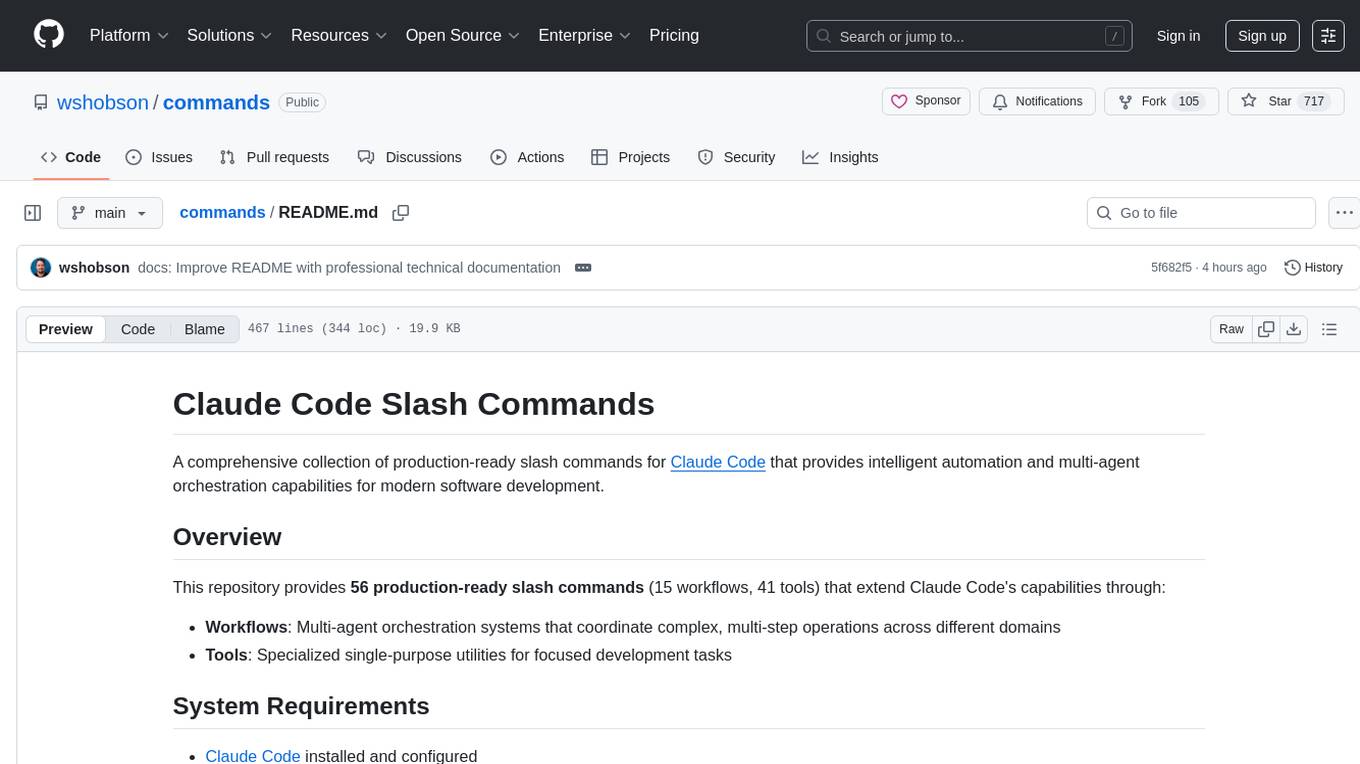
commands
Production-ready slash commands for Claude Code that accelerate development through intelligent automation and multi-agent orchestration. Contains 52 commands organized into workflows and tools categories. Workflows orchestrate complex tasks with multiple agents, while tools provide focused functionality for specific development tasks. Commands can be used with prefixes for organization or flattened for convenience. Best practices include using workflows for complex tasks and tools for specific scopes, chaining commands strategically, and providing detailed context for effective usage.
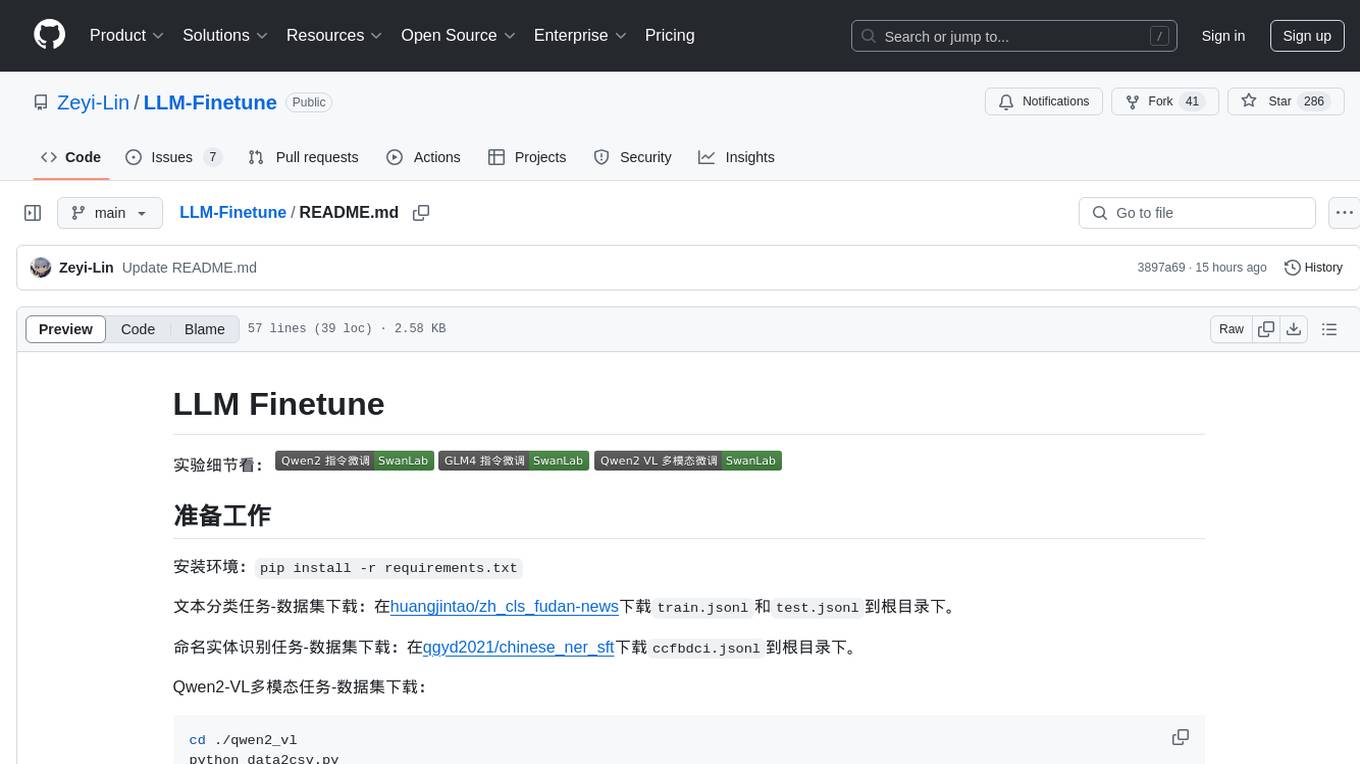
LLM-Finetune
LLM-Finetune is a repository for fine-tuning language models for various NLP tasks such as text classification and named entity recognition. It provides instructions and scripts for training and inference using models like Qwen2-VL and GLM4. The repository also includes datasets for tasks like text classification, named entity recognition, and multimodal tasks. Users can easily prepare the environment, download datasets, train models, and perform inference using the provided scripts and notebooks. Additionally, the repository references SwanLab, an AI training record, analysis, and visualization tool.
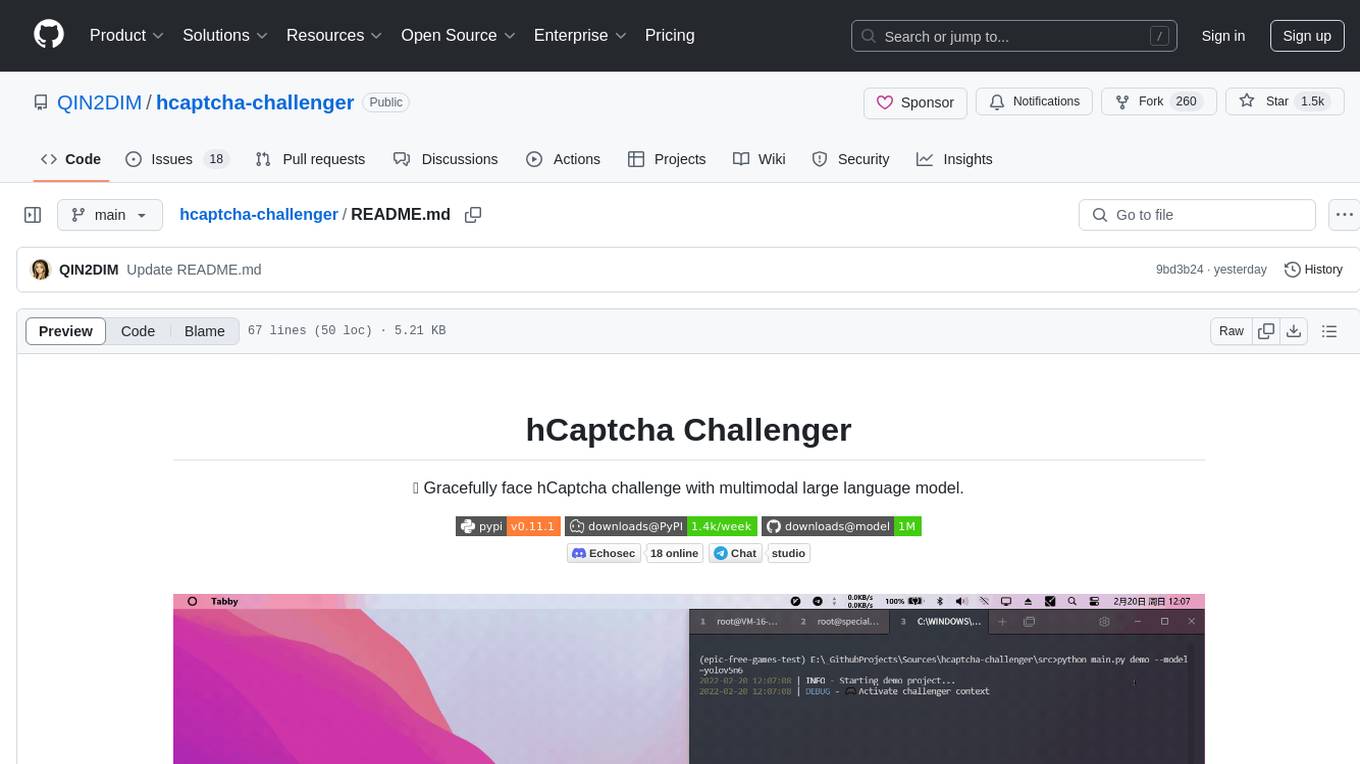
hcaptcha-challenger
hCaptcha Challenger is a tool designed to gracefully face hCaptcha challenges using a multimodal large language model. It does not rely on Tampermonkey scripts or third-party anti-captcha services, instead implementing interfaces for 'AI vs AI' scenarios. The tool supports various challenge types such as image labeling, drag and drop, and advanced tasks like self-supervised challenges and Agentic Workflow. Users can access documentation in multiple languages and leverage resources for tasks like model training, dataset annotation, and model upgrading. The tool aims to enhance user experience in handling hCaptcha challenges with innovative AI capabilities.
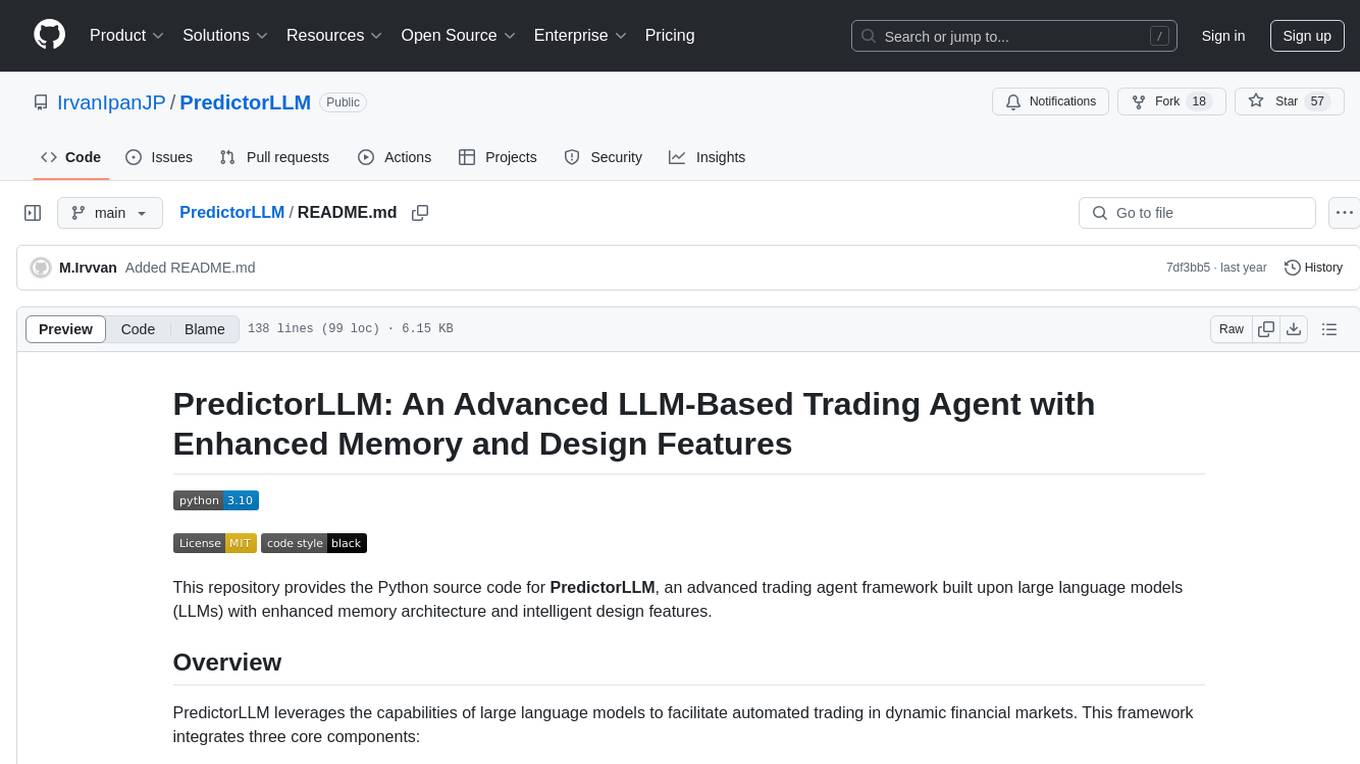
PredictorLLM
PredictorLLM is an advanced trading agent framework that utilizes large language models to automate trading in financial markets. It includes a profiling module to establish agent characteristics, a layered memory module for retaining and prioritizing financial data, and a decision-making module to convert insights into trading strategies. The framework mimics professional traders' behavior, surpassing human limitations in data processing and continuously evolving to adapt to market conditions for superior investment outcomes.
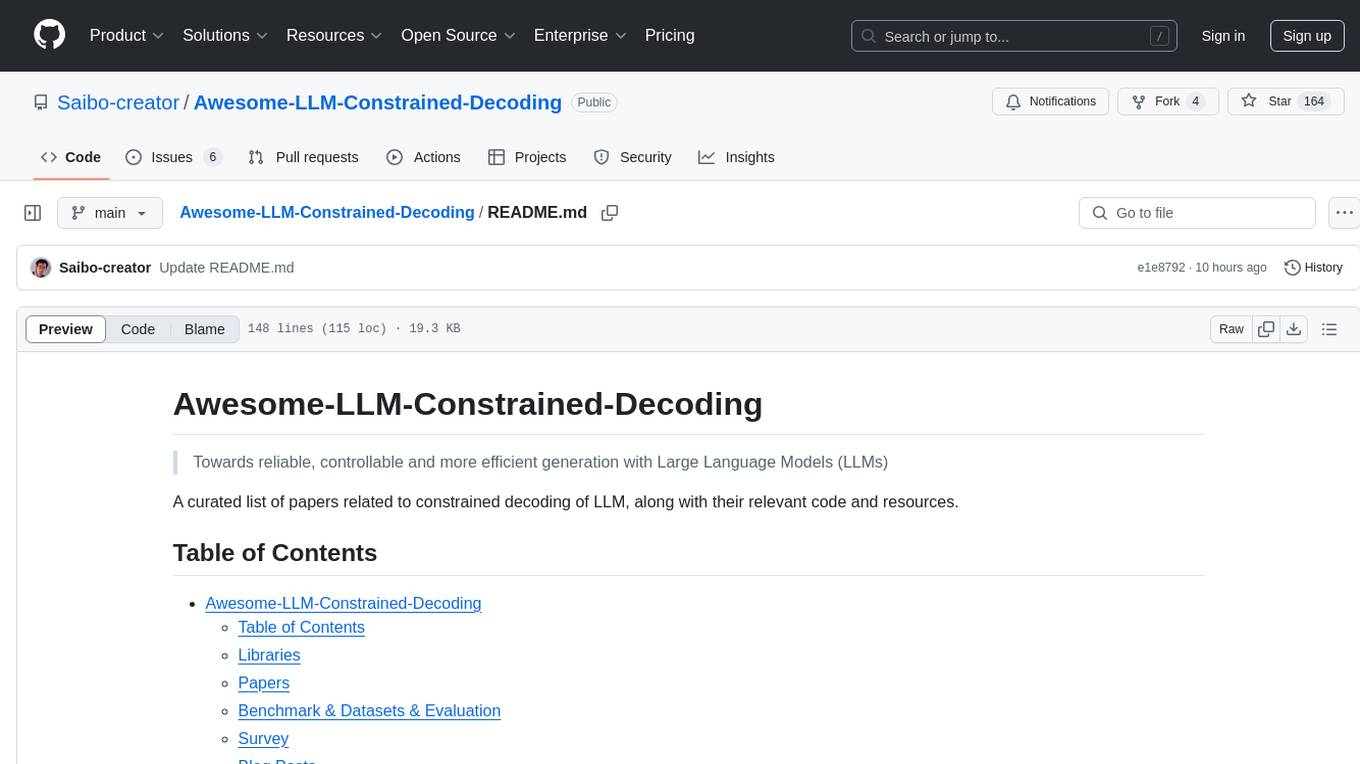
Awesome-LLM-Constrained-Decoding
Awesome-LLM-Constrained-Decoding is a curated list of papers, code, and resources related to constrained decoding of Large Language Models (LLMs). The repository aims to facilitate reliable, controllable, and efficient generation with LLMs by providing a comprehensive collection of materials in this domain.

awsome-distributed-training
This repository contains reference architectures and test cases for distributed model training with Amazon SageMaker Hyperpod, AWS ParallelCluster, AWS Batch, and Amazon EKS. The test cases cover different types and sizes of models as well as different frameworks and parallel optimizations (Pytorch DDP/FSDP, MegatronLM, NemoMegatron...).
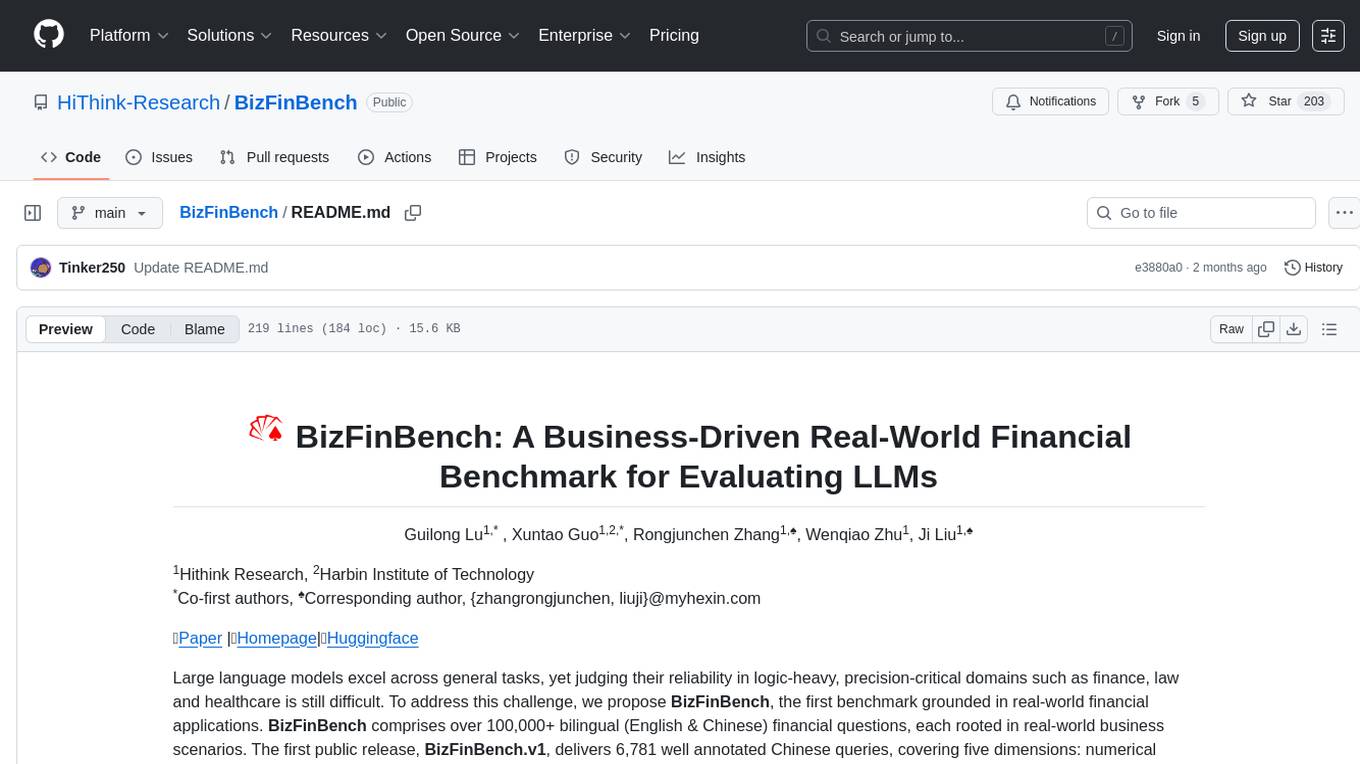
BizFinBench
BizFinBench is a benchmark tool designed for evaluating large language models (LLMs) in logic-heavy and precision-critical domains such as finance. It comprises over 100,000 bilingual financial questions rooted in real-world business scenarios. The tool covers five dimensions: numerical calculation, reasoning, information extraction, prediction recognition, and knowledge-based question answering, mapped to nine fine-grained categories. BizFinBench aims to assess the capacity of LLMs in real-world financial scenarios and provides insights into their strengths and limitations.
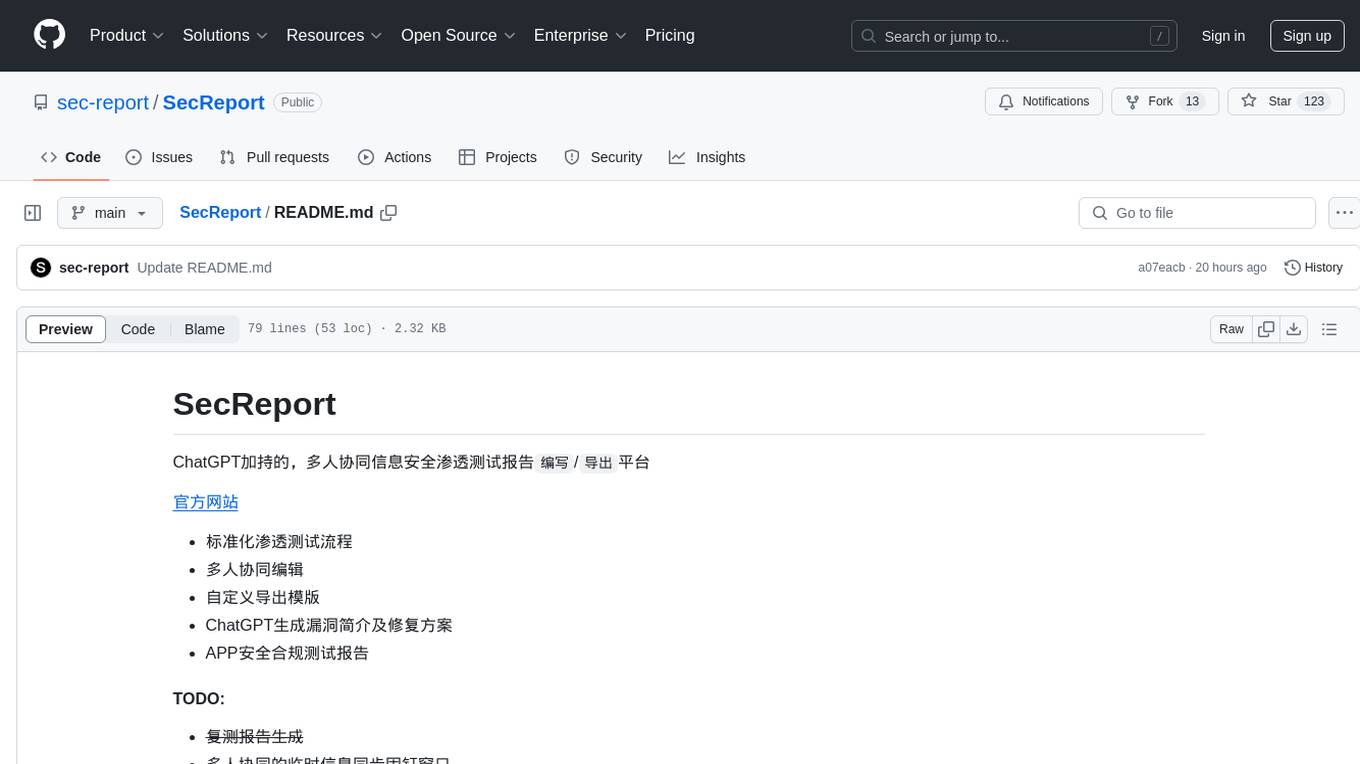
SecReport
SecReport is a platform for collaborative information security penetration testing report writing and exporting, powered by ChatGPT. It standardizes penetration testing processes, allows multiple users to edit reports, offers custom export templates, generates vulnerability summaries and fix suggestions using ChatGPT, and provides APP security compliance testing reports. The tool aims to streamline the process of creating and managing security reports for penetration testing and compliance purposes.
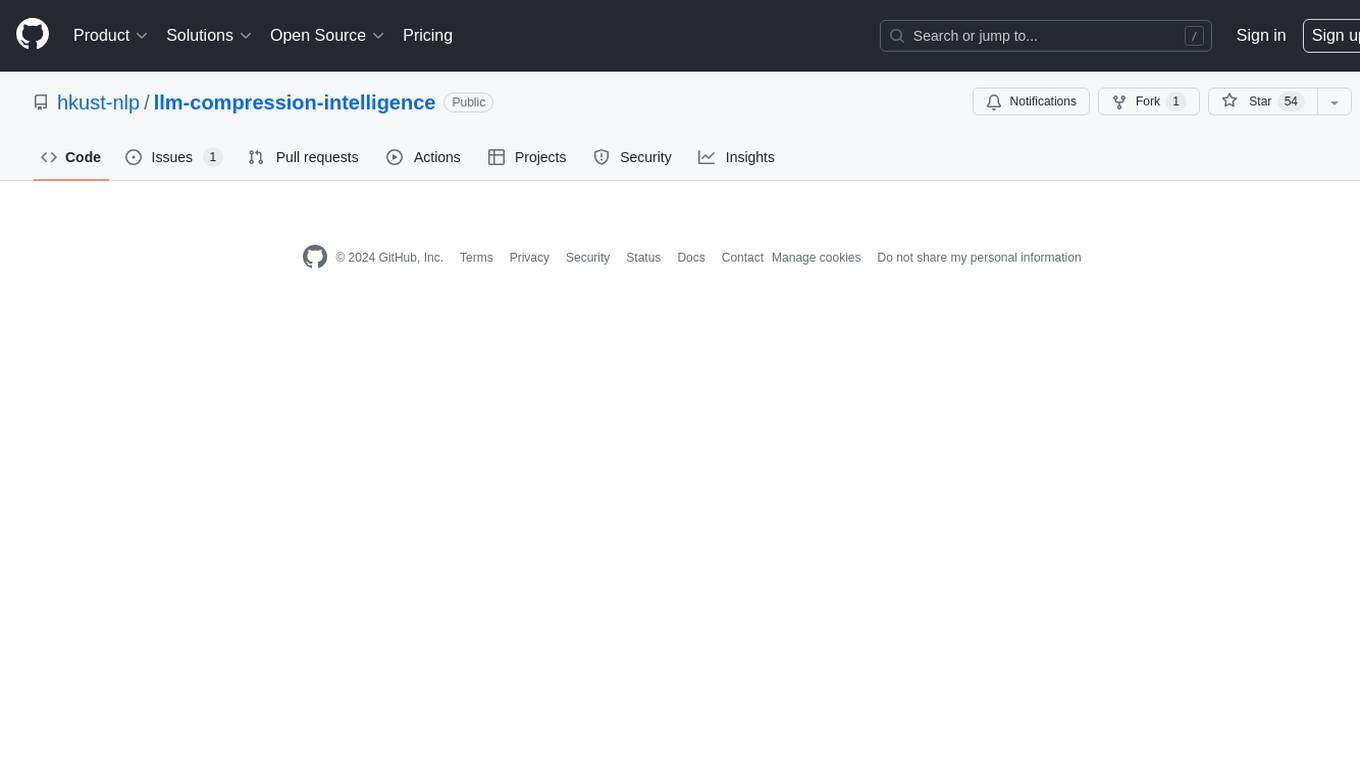
llm-compression-intelligence
This repository presents the findings of the paper "Compression Represents Intelligence Linearly". The study reveals a strong linear correlation between the intelligence of LLMs, as measured by benchmark scores, and their ability to compress external text corpora. Compression efficiency, derived from raw text corpora, serves as a reliable evaluation metric that is linearly associated with model capabilities. The repository includes the compression corpora used in the paper, code for computing compression efficiency, and data collection and processing pipelines.
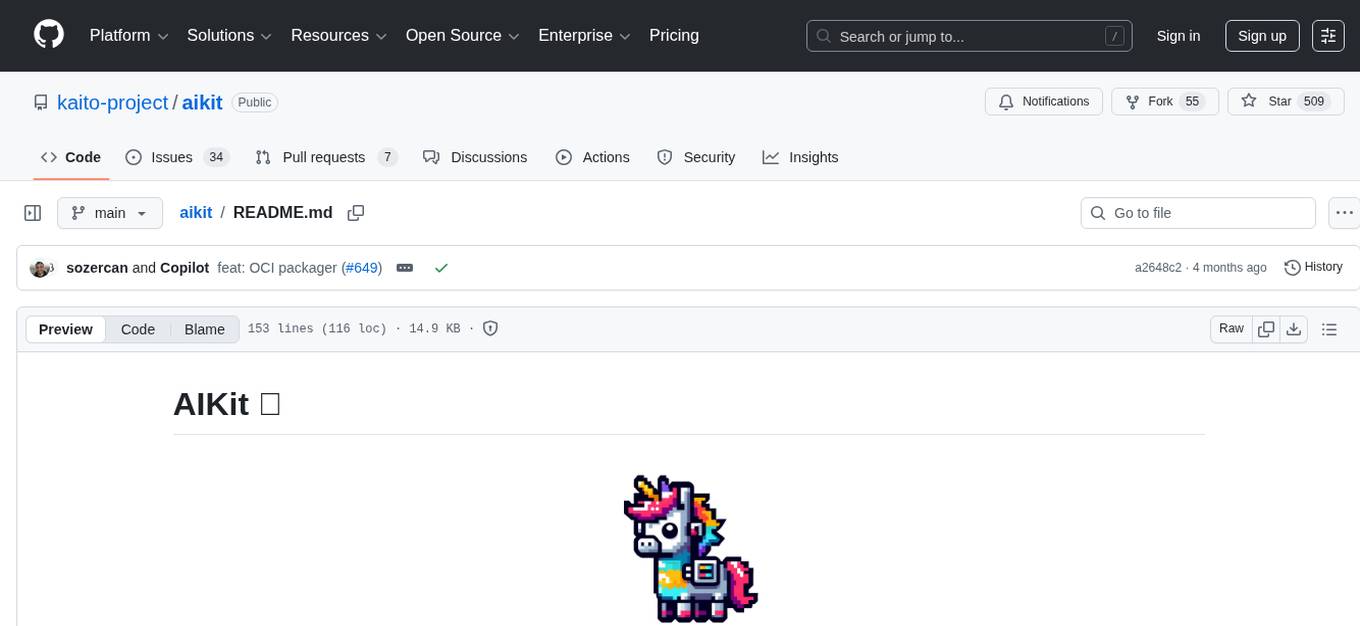
aikit
AIKit is a comprehensive platform for hosting, deploying, building, and fine-tuning large language models (LLMs). It offers inference using LocalAI, extensible fine-tuning interface, and OCI packaging for distributing models. AIKit supports various models, multi-modal model and image generation, Kubernetes deployment, and supply chain security. It can run on AMD64 and ARM64 CPUs, NVIDIA GPUs, and Apple Silicon (experimental). Users can quickly get started with AIKit without a GPU and access pre-made models. The platform is OpenAI API compatible and provides easy-to-use configuration for inference and fine-tuning.
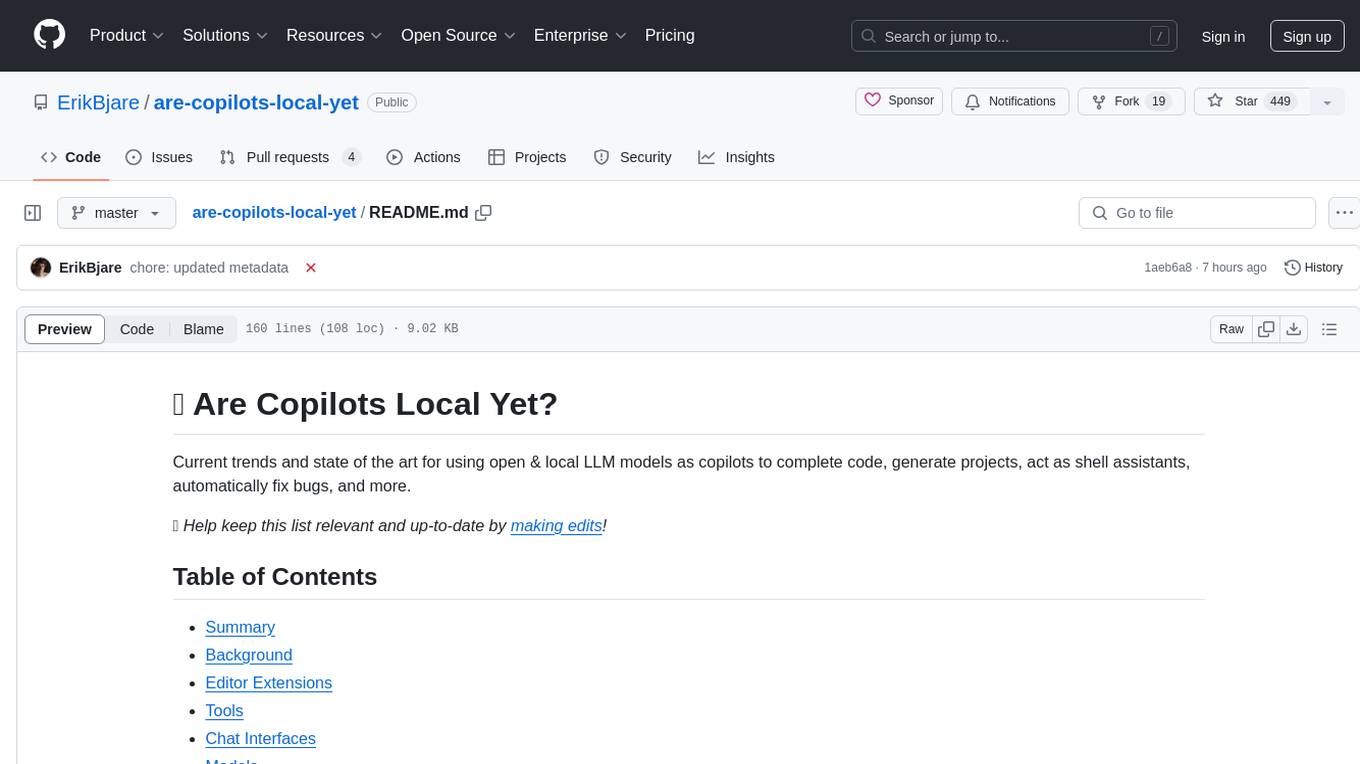
are-copilots-local-yet
Current trends and state of the art for using open & local LLM models as copilots to complete code, generate projects, act as shell assistants, automatically fix bugs, and more. This document is a curated list of local Copilots, shell assistants, and related projects, intended to be a resource for those interested in a survey of the existing tools and to help developers discover the state of the art for projects like these.
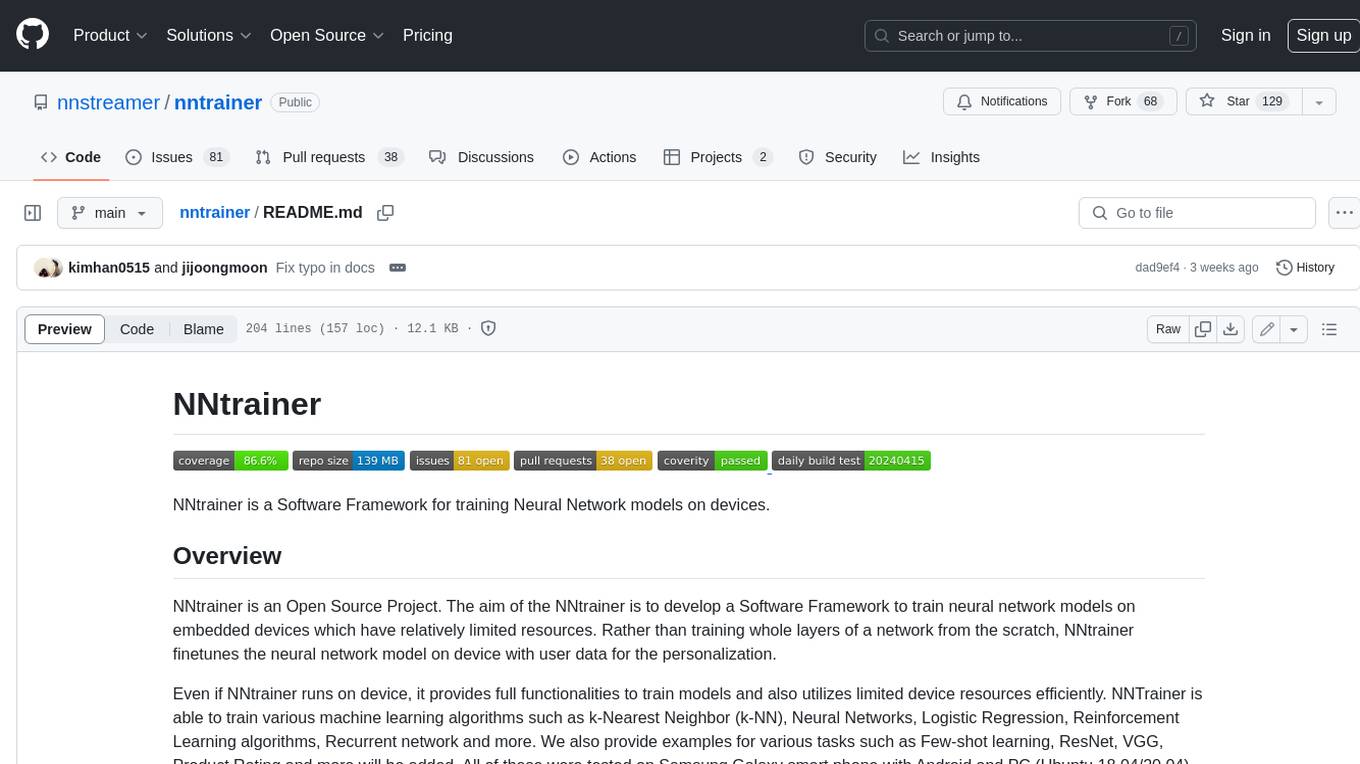
nntrainer
NNtrainer is a software framework for training neural network models on devices with limited resources. It enables on-device fine-tuning of neural networks using user data for personalization. NNtrainer supports various machine learning algorithms and provides examples for tasks such as few-shot learning, ResNet, VGG, and product rating. It is optimized for embedded devices and utilizes CBLAS and CUBLAS for accelerated calculations. NNtrainer is open source and released under the Apache License version 2.0.
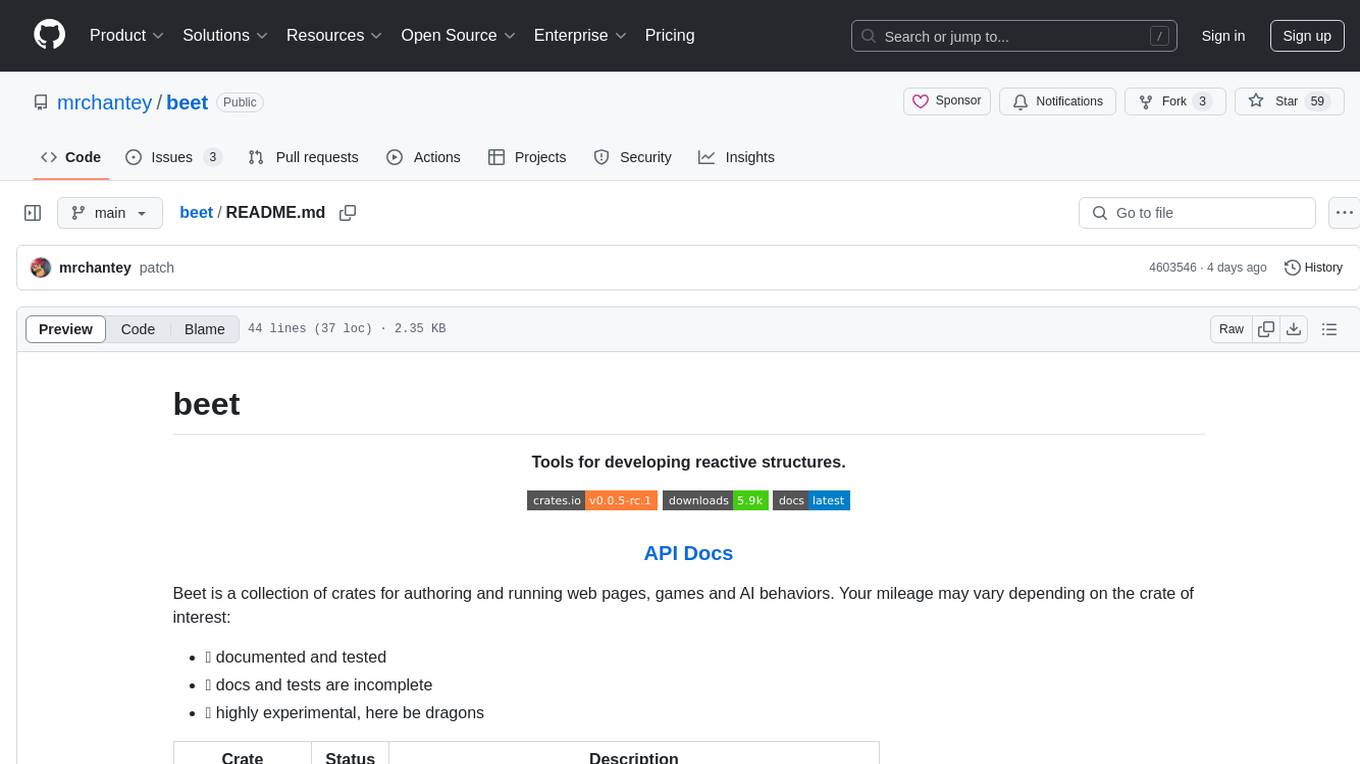
beet
Beet is a collection of crates for authoring and running web pages, games and AI behaviors. It includes crates like `beet_flow` for scenes-as-control-flow bevy library, `beet_spatial` for spatial behaviors, `beet_ml` for machine learning, `beet_sim` for simulation tooling, `beet_rsx` for authoring tools for html and bevy, and `beet_router` for file-based router for web docs. The `beet` crate acts as a base crate that re-exports sub-crates based on feature flags, similar to the `bevy` crate structure.
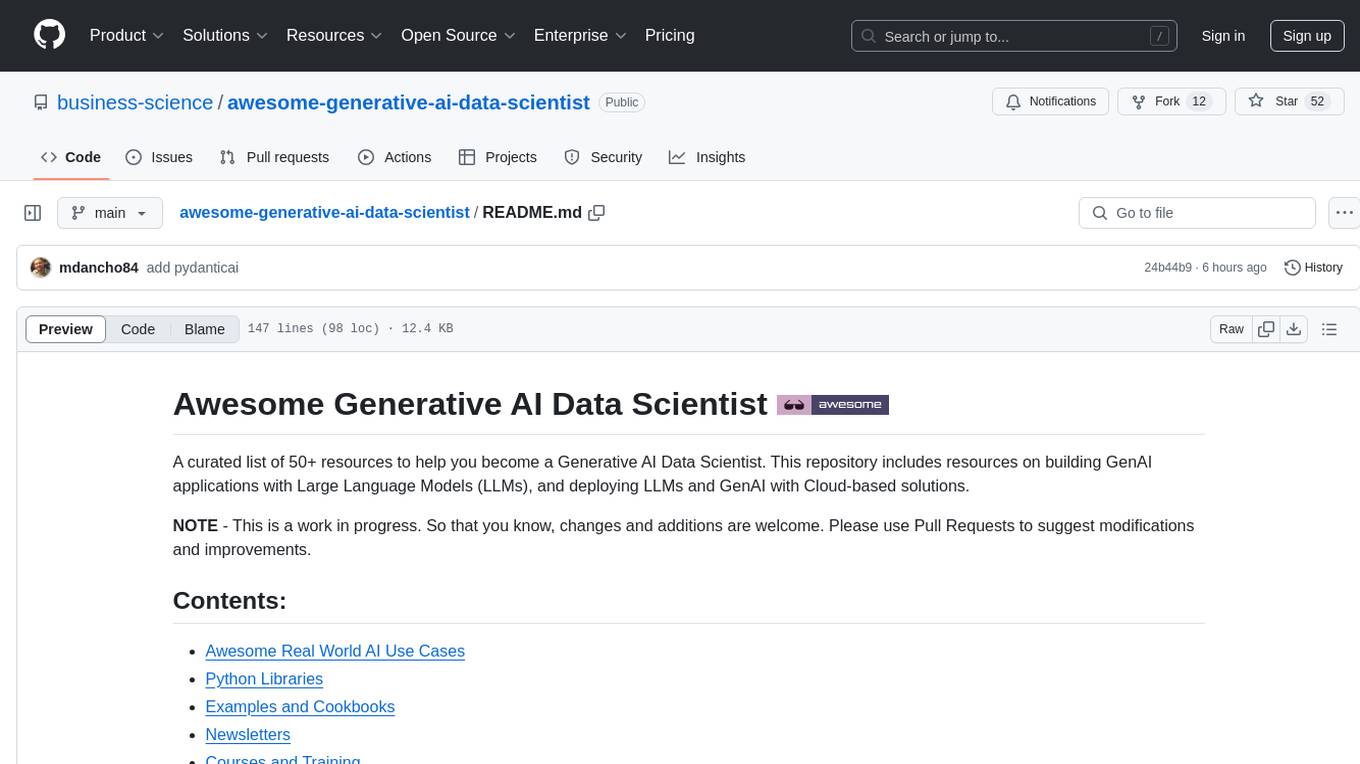
awesome-generative-ai-data-scientist
A curated list of 50+ resources to help you become a Generative AI Data Scientist. This repository includes resources on building GenAI applications with Large Language Models (LLMs), and deploying LLMs and GenAI with Cloud-based solutions.
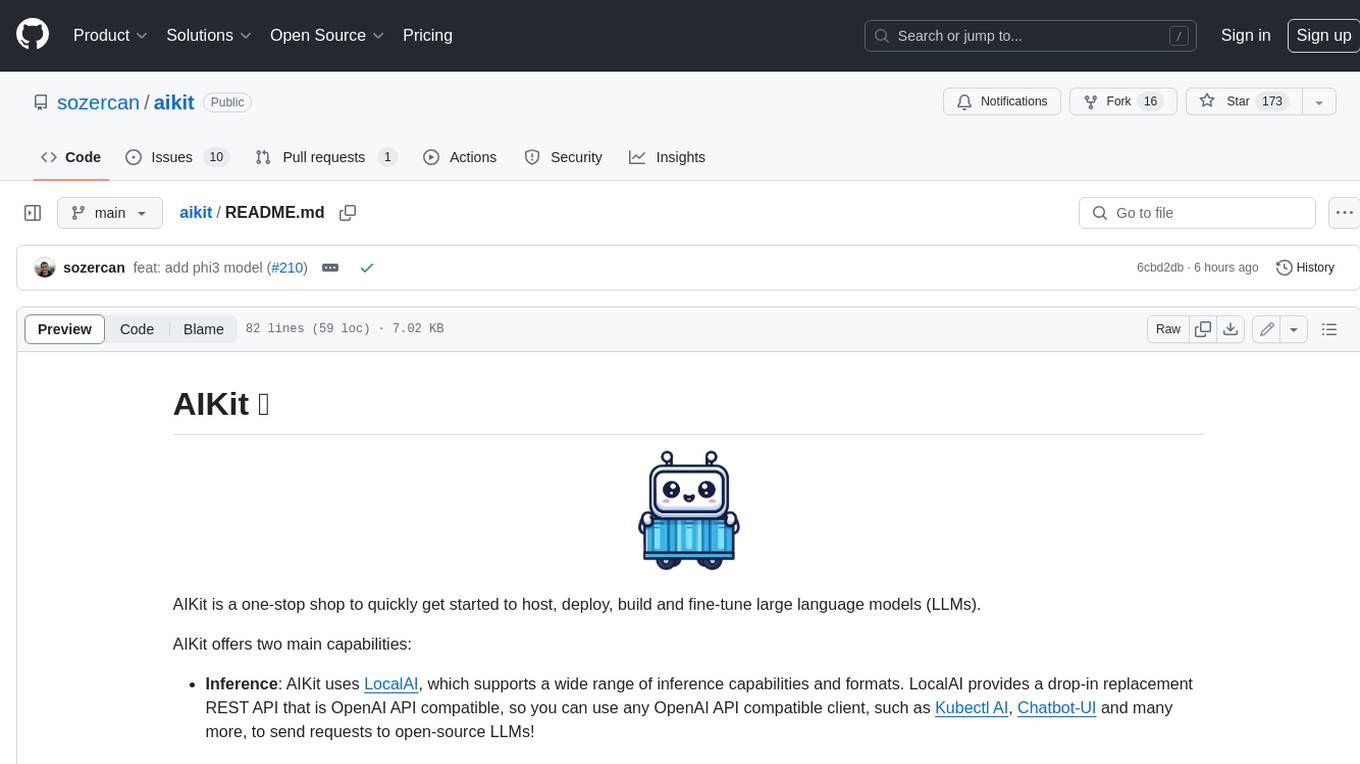
aikit
AIKit is a one-stop shop to quickly get started to host, deploy, build and fine-tune large language models (LLMs). AIKit offers two main capabilities: Inference: AIKit uses LocalAI, which supports a wide range of inference capabilities and formats. LocalAI provides a drop-in replacement REST API that is OpenAI API compatible, so you can use any OpenAI API compatible client, such as Kubectl AI, Chatbot-UI and many more, to send requests to open-source LLMs! Fine Tuning: AIKit offers an extensible fine tuning interface. It supports Unsloth for fast, memory efficient, and easy fine-tuning experience.
For similar tasks

agents
The 'agents' repository is a comprehensive collection of 83 specialized AI subagents for Claude Code, providing domain-specific expertise across software development, infrastructure, and business operations. Each subagent incorporates current industry best practices, production-ready patterns, deep domain expertise, modern technology stacks, and optimized model selection based on task complexity.
For similar jobs

weave
Weave is a toolkit for developing Generative AI applications, built by Weights & Biases. With Weave, you can log and debug language model inputs, outputs, and traces; build rigorous, apples-to-apples evaluations for language model use cases; and organize all the information generated across the LLM workflow, from experimentation to evaluations to production. Weave aims to bring rigor, best-practices, and composability to the inherently experimental process of developing Generative AI software, without introducing cognitive overhead.

agentcloud
AgentCloud is an open-source platform that enables companies to build and deploy private LLM chat apps, empowering teams to securely interact with their data. It comprises three main components: Agent Backend, Webapp, and Vector Proxy. To run this project locally, clone the repository, install Docker, and start the services. The project is licensed under the GNU Affero General Public License, version 3 only. Contributions and feedback are welcome from the community.

oss-fuzz-gen
This framework generates fuzz targets for real-world `C`/`C++` projects with various Large Language Models (LLM) and benchmarks them via the `OSS-Fuzz` platform. It manages to successfully leverage LLMs to generate valid fuzz targets (which generate non-zero coverage increase) for 160 C/C++ projects. The maximum line coverage increase is 29% from the existing human-written targets.

LLMStack
LLMStack is a no-code platform for building generative AI agents, workflows, and chatbots. It allows users to connect their own data, internal tools, and GPT-powered models without any coding experience. LLMStack can be deployed to the cloud or on-premise and can be accessed via HTTP API or triggered from Slack or Discord.

VisionCraft
The VisionCraft API is a free API for using over 100 different AI models. From images to sound.

kaito
Kaito is an operator that automates the AI/ML inference model deployment in a Kubernetes cluster. It manages large model files using container images, avoids tuning deployment parameters to fit GPU hardware by providing preset configurations, auto-provisions GPU nodes based on model requirements, and hosts large model images in the public Microsoft Container Registry (MCR) if the license allows. Using Kaito, the workflow of onboarding large AI inference models in Kubernetes is largely simplified.

PyRIT
PyRIT is an open access automation framework designed to empower security professionals and ML engineers to red team foundation models and their applications. It automates AI Red Teaming tasks to allow operators to focus on more complicated and time-consuming tasks and can also identify security harms such as misuse (e.g., malware generation, jailbreaking), and privacy harms (e.g., identity theft). The goal is to allow researchers to have a baseline of how well their model and entire inference pipeline is doing against different harm categories and to be able to compare that baseline to future iterations of their model. This allows them to have empirical data on how well their model is doing today, and detect any degradation of performance based on future improvements.

Azure-Analytics-and-AI-Engagement
The Azure-Analytics-and-AI-Engagement repository provides packaged Industry Scenario DREAM Demos with ARM templates (Containing a demo web application, Power BI reports, Synapse resources, AML Notebooks etc.) that can be deployed in a customer’s subscription using the CAPE tool within a matter of few hours. Partners can also deploy DREAM Demos in their own subscriptions using DPoC.